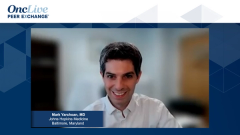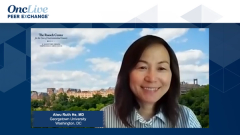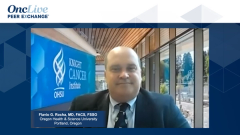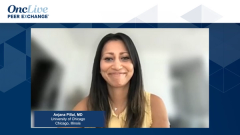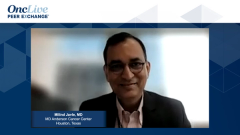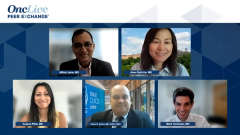
Advanced Biliary Tract Cancers: Novel Biomarker Strategies
Closing out their discussion on the management of biliary tract cancers, experts share excitement for future evolutions in the treatment landscape.
Episodes in this series

Transcript:
Milind Javle, MD: In terms of the biomarkers, are there any others that you would think are going to be particularly path breaking in biliary tract cancer that we should be doing? Standard is NGS [next-generation sequencing], the panel keeps expanding. Ruth, you alluded to liquid biopsies. Perhaps some people have started doing minimal residual disease testing post-surgery. Is there any other pathway that you are looking at, any other markers, ctDNA [circulating tumor DNA] or microRNA, or any other immune profiling studies? Mark, you’re in the forefront of all this, anything that hits the target in the short term?
Mark Yarchoan, MD: I think what many of us have started doing is combining tumor-based profiling with liquid biopsies. And liquid biopsies have already shown some utility in monitoring, for example, resistance mutations to FGFR inhibitors. My colleague, Marina Baretti, [MD,] had a lovely talk at ASCO [American Society of Clinical Oncology annual meeting], where she gave an overview of some of these data. We certainly have started considering patients for clinical trials of novel FGFR inhibitors if they have resistance mutations pop up on liquid biopsy. I think that’s the direction that the field may go in the near future.
Milind Javle, MD: This has been a very exciting, rich, and informative discussion. I’ve learned a lot from your experience in treating biliary tract cancer, and I’d like to conclude. Before doing that, I’d like to get a few final thoughts from all of you, and this may be something you’re looking forward to in terms of biliary tract cancer and further management. Let me start with you, Flavio, any final thoughts on this topic?
Flavio G. Rocha, MD, FACS, FSSO: Yes, my encouragement would be to have my colleagues help us expand the candidate pool for either curative surgery or transplantation because I think that’s where we want to get. I think as we learn more about this disease and find new targets, find new agents, let’s get patients there.
Milind Javle, MD: Anjana?
Anjana Pillai, MD: I would have to echo Flavio there. I think this multidisciplinary team, like we have assembled here, is key to these cancers and is not always done everywhere. Therefore, I think this is how you move the field forward and try to get hopefully more curative options and long-term survival. We learn so much. I’ve learned so much just from this hour and a half listening to you all, so I think this is the key to the future of this field and for our patients.
Milind Javle, MD: Thank you, Anjana. Ruth?
Aiwu Ruth He, MD: I think patients should get a profile of their tumor and support clinical studies, try to enroll in clinical trials that test novel targets.
Milind Javle, MD: Mark?
Mark Yarchoan, MD: I would say pemigatinib was the first FDA-approved drug for cholangiocarcinoma, and just a few years later we have multiple approvals. So this is a super exciting time for our field, and I think we’re only going to continue to make progress if we continue to enroll in clinical trials. To all the patients, I think the clinical trials are great ways to get access to novel therapies, but also to help everyone else with this cancer. Thank you for participating.
Milind Javle, MD:I want to thank all the presenters. This is an exciting time for all of us. I want to tell you my personal story. I began this journey 15 years ago, and my seniors advised me then that this was not a good disease to treat, you can never make your career in biliary tract cancer. And here I am now 15 years later. It’s a great privilege to have this talented group of clinical researchers on this journey with me. I hope that this example will be an incentive for other young investigators, researchers, scientists, and advocates to join us on this journey because it requires a village. Today we are on a threshold of new beginnings of this cancer, with immunotherapy finally making headway. The durvalumab TOPAZ-1 study is positive. This hopefully will be the advent of new beginnings, the advent of new therapies in this cancer, and I look forward to the future with great optimism as never before.
Transcript edited for clarity.


